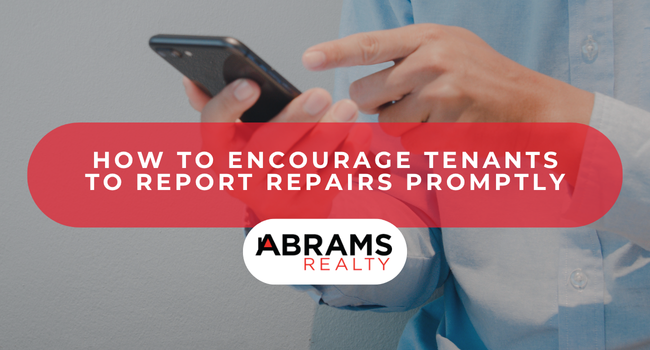Key Takeaways:
Tenant Communication Is Crucial: Clear, easy-to-use communication channels make it simple for tenants to report issues before they become costly problems.
Prevention Starts with Screening and Onboarding: Selecting responsible tenants and setting expectations early helps ensure they care for the property proactively.
Prompt Response Builds Trust: Quickly addressing maintenance requests shows tenants you care, encouraging them to report future issues right away.
A major concern for landlords and property investors is how to lower the maintenance costs of their buildings to make their investments more profitable. If the problems in a rental property are detected on time, most emergencies can be averted, and the cost of repairs can be significantly reduced.
But the challenge is how do you, as a landlord, preempt the maintenance problems in your rental property, or at least, find and fix them before they cause major damage?
The answer is simple. Every investment property owner knows that tenants are in the best position to help them keep up with the problems in their building.
That is because your tenants live in the building and interact with its features every day. They have real-time information on how the doors, windows, plumbing, appliances, and all other components work. Unlike you, they don’t need to inspect the building to know the physical state of its systems and structures.
The question is, how do you gain access to what your tenants know? How can you recruit them as partners in the upkeep of your rental property? Of course, it is recommended that you include tenants' maintenance obligations in the rental’s lease agreement, but in most cases, this is not enough to give you the best results.
Ideally, you want your tenants to look after your building as if it were their own, not just because it is mandated in the lease contract. You want them to be personally invested in maintaining the property in the best shape possible. How do you do that?
Here are some strategies from the experts at Abrams Realty to help you achieve that result.
What's Your Rental Worth?
Book a Free Rental Analysis Now!
How to Get Your Tenants to Report Repairs Promptly
1. Employ a Detailed Tenant Screening Process
The quality of the tenants in your property largely depends on your marketing and tenant screening. If you want renters who will take good care of the property, you cannot be hasty when doing background checks on potential tenants.

If a potential tenant has a history of litigation, rent defaults, and evictions in previous rented homes, you can expect them to cause you problems if you rent to them. Tenants who neglect or willfully damage your property will not report the maintenance issues in the building (that they caused) promptly.
Instead, they are more likely to embroil you in costly and lengthy lawsuits. 80% of the work of getting tenants to maintain a rental property properly is done before you lease to them (during tenant screening); only 20% is done after leasing to the tenant.
2. Pay Attention to Tenant Onboarding
Your tenant onboarding process is your best chance to reiterate the terms of the lease and establish a good relationship with your tenants.
Looking to learn more about the tenant onboarding process? Read our guide on how to set clear expectations with tenants.
This is when you make sure your tenant’s expectations align fully with yours. During the physical walkthrough of the rental, you want to explain to your tenants how key features of the property work to minimize the risk of damage.
This is also when you guide tenants through your communication protocols, how to report problems, and submit maintenance requests. Bear in mind that tenants are sometimes slow to report the issues in their unit because they are afraid that they will be blamed for those problems.
If you explain to tenants that most problems in a rental property are not renter-caused but the result of wear and tear due to normal use, they will be less reluctant to call you when problems happen.
Have a Question?
Ask a Property Manager!
3. Employ Easy-to-Use Communication Systems
Your communication systems are key. Sometimes tenants want to report problems, but the process of doing so is too difficult. To avoid the stress, tenants keep postponing submitting the report, while the problems in your property mount.

The best tenant communication systems are simple, and they use methods that tenants are familiar with: email, SMS, chat, and phone.
Looking to learn the best way to reach out to your tenants? Read our post on the most effective methods of tenant communication.
Beyond the actual system, it is important to build rapport. Don’t just communicate with tenants when it is time to collect rent money. Reminders help your tenants remember their obligation. Occasional messages that explain how to deal with specific issues are also valuable.
Most importantly, if tenants don’t receive satisfactory answers to their communications, they will be less likely to report problems.
4. Respond to Maintenance Requests Promptly
If you handle maintenance requests in your rental property efficiently, your costs will be lower and your tenants will be happier. Happy tenants are more likely to renew their leases, and that means even lower operating costs for you, via lower vacancy costs. What are the best practices when responding to tenants’ maintenance requests?
Firstly, understand what the problem is. Not all problems require you to send someone over to the rental unit to fix the issue. With proper guidance, minor problems in the property can be solved by the tenant.
Pay attention to the vendors you use; if they are tardy, rude, or sloppy, they will cost you more money than necessary and impair your relationship with your tenant. If a tenant has damaged your property, explain to them how their actions caused the problem and show them how to avoid the issue in the future.
5. Do Not Skip Seasonal Inspections
Scheduled inspections of the property help you take control of your property maintenance instead of relying solely on what your tenants report. Seasonal inspections are your most important preventive maintenance tool.

If done right, they help you detect the problems in a rental property on time and even prevent some of those issues or at least minimize their repair costs.
Seasonal property inspections should be baked into the terms of the lease, and your tenants must understand the importance of this one item. When inspecting a rental property, in addition to evaluating the physical condition of the systems and structures of the building, use that time to educate your tenants on the proper use of the features of the property.
Carry your tenants along throughout the entire process, even if the detected issues are not caused by them.
Finally, if you want your tenants to look after your property as if it were their home, you should treat them as more than customers. Don’t contact your tenants only to remind them of the rent or other issues in the rental. Remembering small details like birthdays, first names, and sending thank you notes at year's end can make a lot of difference.
Want to learn more about tenant satisfaction? Read our blog on how to keep renters happy.
Why Partnering with Abrams Realty Makes All the Difference
Keeping tenants engaged in the upkeep of your property takes more than just good intentions. It takes systems, communication, and experience.
That’s where Abrams Realty shines. Our team understands that proactive maintenance isn’t just about fixing what’s broken—it’s about preventing issues, building trust with tenants, and protecting your bottom line.
We combine thorough tenant screening, seamless onboarding, and user-friendly communication tools to ensure your renters feel comfortable reporting repairs promptly. Our responsive maintenance team and reliable vendor network handle requests quickly and professionally, keeping both you and your tenants happy.
With Abrams Realty managing your property, you won’t just reduce maintenance costs—you’ll enhance tenant satisfaction, minimize turnover, and preserve the long-term value of your investment. We help you turn tenant cooperation into one of your property’s greatest assets.


